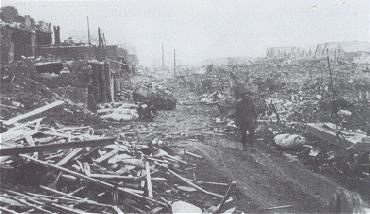
For one of the Netherlands’ best beloved football stars of the seventies, Willem van Hanegem, it was a close shave that day. It was only luck that he survived the bombardment of Breskens as a small child, as his father did not, dying on top of another small child whose life he saved this way. With van Hanegem’s father, another 183 Bressiaanders would die as allied planes bombarded the town in an attempt to cut off retreating German forces.
Antwerp had been liberated only days before, on September 4th, but the allied troops had not yet moved beyond the city towards the Schelde estuary. Caught between the advancing Allied troops and the river were still thousands of German soldiers and their equipment, who used the breathing space given to them to both reinforce their defensive positions on the south side of the river and evacuate to the north, from Breskens to Vlissingen, keeping the Schelde closed for allied traffic and hence preventing the use of Antwerp as a supply point much closer to the frontlines than the French ports they had been using until then. To use Antwerp then, the Allies had to move into Zeeland, taking control of both sides of the Schelde estuary, and the obvious first step towards that goal was to prevent the German forces still on the south side from escaping.
The town of Breskens, a small fishing village almost directly opposite the navy town of Vlissingen (or Flushing as English speakers know it better), was an obvious evacuation point, where thousands of German troops were ferried across. Its inhabitants had long become used to seeing Allied bombers flying over to attack Vlissingen with its dockyard and naval base, but had not yet been a target themselves. Which may explain why the bombardment of 11 September 1944 claimed so many victims. In military terms, this may have been a justifiable action, the many civilian victims a regretablle price to pay for making sure more German forces wouldn’t escape to fight on in Walcheren and Zuid-Beveland. But the price paid was heavy and still visible in the town today, a reminder of what happens even in ‘good’ wars.